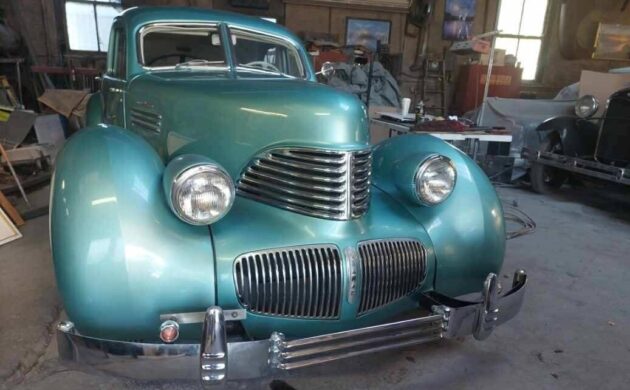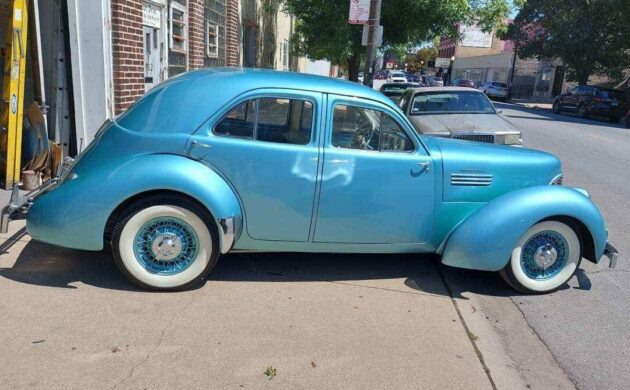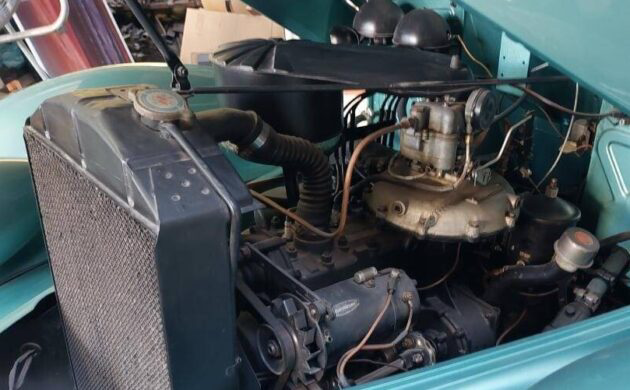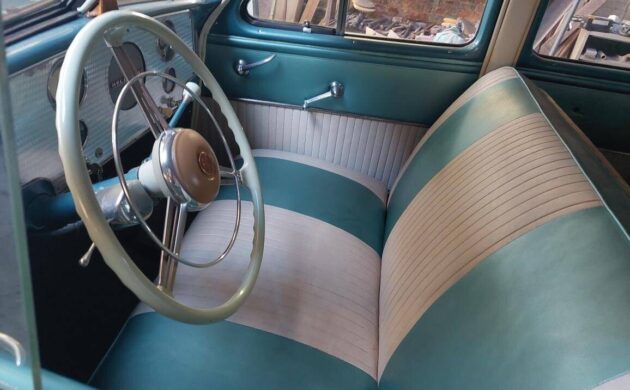Supercharged! 1941 Graham-Paige Hollywood
America’s automotive past is littered with marques that were notable for unique features or designs. Unfortunately, standout qualities didn’t guarantee survivability – the non-stop beat of competition and the challenges associated with a very capital-intensive business usually conspired to deliver a knock-out punch to those lesser-heeled manufacturers. Graham-Paige (1927-1941) is one such player and today we have a 1941 Hollywood model to review – and this one’s a real looker! Pat L. found the listing for this Chicago, Illinois domiciled sedan, it’s available, here on craigslist for $30,000.
In 1939 Graham-Paige developed a joint venture with Hupp Motor, the builder of the Hupmobile. Hupp owned the dies for the famous Cord 810/812 and they served as a basis for the new G-P “Hollywood”. Production started in 1939, as a ’40 model, and continued on into the early portion of the ’41 model year. The total production volume was about 1,500 copies, spread across two body styles, a convertible and a four-door sedan. As for Graham-Paige, the name survived until 1962 but World War II interrupted its auto business and then Kaiser-Frazer acquired Graham-Paige equity ownership in 1944 so new post-war cars bore the former’s name. The Graham-Paige name was last associated with real estate development before it completely disappeared.
If you examine our subject car, you can see some resemblance to the Cord and it’s a stunner. The seller states, “Car was dismantled, and fully professionally restored in 2018, with new chrome, interior, paint, etc. It was painted a Ford pearl blue, from a 2002 T-Bird“. There’s no missing that pearl blue finish – it’s a mile deep and there is no evidence of a single imperfection. Notable features are the reverse opening front doors and small, divided rear windows. The listing mentions that the wire wheels are Chrysler pieces.
Power is provided by a 120 HP supercharged 218 CI, in-line six-cylinder engine that is said to “run great“. Unlike the Cord, the Hollywood is a more traditional front engine, rear-wheel drive arrangement that incorporates a typical three-speed manual transmission.
The interior, according to the seller, does not follow originality but was reupholstered in a “1960s-style” during the restoration. It’s a bright, cheery environment of matching (exterior) pearl blue and off-white – definitely not as somber as one would have found back in ’41. It appears that every inch of the interior, dash, door panels, headliner, etc. got the redo because it’s all perfect. It’s not possible to get a total glimpse of the instrument panel but it is rather diminutive with a few large, round gauges and not as elaborate as is often found in automobiles from this era.
The seller states that this Hollywood has been in the same family for 64 years but doesn’t elaborate if it’s his family or he’s just handling the sale. Whatever the case, this is a truly magnificent-looking sedan and its non-stock changes really bring this car to life – it just leaps right off of the listing. Considering its condition, and what it is, do you think this 1941 Graham-Paige Hollywood is priced right, or not quite?
Auctions Ending Soon
 2006 Ford Mustang Saleen S281 SCBid Now7 hours$15,000
2006 Ford Mustang Saleen S281 SCBid Now7 hours$15,000
 2002 Subaru Impreza WRXBid Now3 days$333
2002 Subaru Impreza WRXBid Now3 days$333
 1975 Chevrolet Corvette ConvertibleBid Now3 days$3,000
1975 Chevrolet Corvette ConvertibleBid Now3 days$3,000
 1964 Ford F-100 Camper CustomBid Now3 days$2,000
1964 Ford F-100 Camper CustomBid Now3 days$2,000
 2006 Jeep Wrangler SportBid Now5 days$10,500
2006 Jeep Wrangler SportBid Now5 days$10,500







Comments
Not quite as good looking as the Cord the proportions seem a bit off but those are some beautiful lines. The rear is great veiw. The car has been modernized just a bit, paint and interior but still a very nice car. Price doesn’t seem that far off and somebody should get a hold of a nice ride.
A beauty! But that GTS in the background…
Beautiful automobile that I have never heard of. It was satisfying to read the write up with ties to Cord, because scrolling through I caught this out of the corner of my eye and thought “is that a Cord?” My next thought was “oh, no of course not..” you can see it in the lines a bit, but it the grill slats that really affirm the connection.
Nice to see another Hollywood here.
Too bad about the outdated updates…
What a gorgeous car. I love it. ❤️
Great looking car, not many of these around since so few were made. Supposedly Graham had orders for 40,000 cars but couldn’t make them fast enough, the Cord stamping dies weren’t really set up for mass production. The Graham six was what became the Continental six that was used by Kaiser, Checker and others. I have only heard of one convertible, a prototype that was used at one of the Graham brother’s beach house, does anyone know of any more?
Starting production in 1940. I guess timing is everything. Too bad. Great looking automobile, and a “split-window” to boot.
Located in the Bridgeport neighborhood of Chicago. The home of Hizzoner, Mayor Richard J. Daley.
BF: “The total production volume was about 1,500 copies, spread across two body styles, a convertible and a four-door sedan.”
Uh, no. There was never a production convertible, only a prototype or two. All the production cars were 4-door sedans.
Also these were just Graham Hollywoods, not Graham-Paige Hollywoods.
Cool car.
Graham-Paige thought enough of it to actually advertise it to the public.
And prototype or not, the convertible exists:
https://www.hagerty.com/media/car-profiles/1940-graham-hollywood-convertible/
JO
Blue car – saw it in 1996 in San Diego.
Seems like a great buy for someone who’s more concerned with presentation than originality.
One of the factors contributing to the Cord’s failure was its roof design. All-steel roofs were very new in the mid-30s, and Cord’s solution was a multi-piece roof that required expensive and time-consuming finishing. To its credit, Graham-Paige recognized this and scraped up money for better roof tooling, but it wasn’t enough to save the project. It would have been cheaper to simply cover it up with fabric (a la 1976 Seville).
So, was this car a favorite of the 2001 Chrysler PT Cruiser designers? I had a 2001 PT Cruiser from 2003 to 2013 that I loved the retro design and had no problems. I traded it for a new 2013 Hyundai Veloster (same length, width, hip and leg room, hatchback floor space, but a much lower roof line and still my main driver today.
So wish II could bring this rare car home. It would be a nice addition to our collection. But, the stable is full.
Sparse, simple, minimalist, instrument panel. Not diminutive.
Diminutive refers to something being extraordinarily small.
This dashboard is pretty standard in size for the period.
One You Tuber recently referred to the new Ford Maverick as “diminutive”, which is absurd.
A Fiat 500 is diminutive. A clock in the dashboard or a gauge can be diminutive.
That’s your interpretation, not mine. Call it what you want, I say the instrument panel is diminutive, as I wrote, considering the width of the dash and I stand by that description.
JO
Priced right. Please somebody buy this car and give it a good home with a roof over it’s head.
Bumpers are wrong for this car but correct for a Cord. Just looking at the pictures you can see they overrun the body. Can’t see enough of the gauges to determine if they are correct. And these cars were Graham and not Graham Paige.
It’s gorgeous.
But one look at the interior (Which is ok) had me thinking of the grilled cheese, French fry and Coke lunch special at the S.S. Kresge’s in store diner during my younger years in the 1960’s.
Then I read that it’s spent six decades in the Chicago metropolitan area where there were a lot of Kresge’s stores.
The owner must have loved those shiny vinyl booths a lot.
And my first look had me thinking Cord.
Especially the lack of vestigial running boards.
Those are Artillery Wheels, not wire wheels, but I like them. Thanks for this listing.
`I always thought reverse-opening car doors were called “suicide” doors. Curious why you didn’t use that term.
Look more carefully at the pictures. The front doors are front opening also referred as suicide doors while the back doors are conventional rear opening style. Trust me I know because I own one.
Those are wire wheels. See all the spokes running from the center cap to the bead area of the wheel. Just like a bicycle wheel. Artillery wheels have a series of hole running around the outer perimeter where the tire bead seats.
Great looking car. Someone will snap this one up quick!
Just saw one at a show that was rodded. Beautiful job was done, Champagne color paint with light brown leather interior.